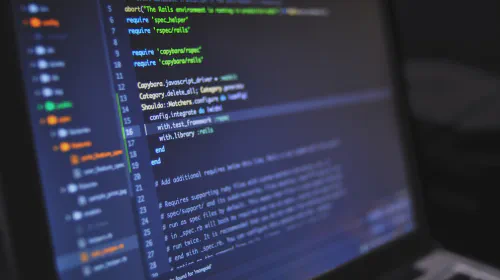Tips to Improve Your Computer’s Security: Essential Measures for Cyber Safety
Salomon Kisters
Jun 19, 2023This post may contain affiliate links. If you use these links to buy something we may earn a commission. Thanks!
In today’s digital age, having a safe and secure computer is more important than ever. With cybercriminals becoming increasingly advanced in their methods, it’s essential to take all the necessary measures to prevent any sensitive data from falling into the wrong hands.
Luckily, there are plenty of tips and tricks that you can implement to improve your computer’s security. In this blog post, we’ll provide you with some useful advice to help keep your computer protected from potential threats.
From updating your software to practicing safe browsing habits, these tips are easy to follow and can make a big difference in keeping your data safe and secure. Read on to find out more.
Keep Operating System and Software Up To Date
One of the easiest ways to improve your computer’s security is to ensure that your operating system and software are always up to date. Developers regularly release updates, patches, and security fixes, often in response to new threats identified by their security teams. If you are not updating your system and software regularly, you could be leaving your computer vulnerable to these threats.
Not only do updates address security gaps, but they can also improve your computer’s performance. These updates can speed up your system, fix bugs, and add new features. Keeping your software and operating system up to date is a simple and effective way to ensure that your computer is running smoothly, quickly, and securely.
To make sure your computer is up to date, turn on automatic updates if possible. Developers often recommend this option because it ensures your system is constantly updated without manual intervention. However, if you prefer to have more control over what updates you install, check for updates regularly and install them as soon as possible.
In addition to updating your operating system and software, make sure to update your antivirus software as well. Antivirus software helps protect your computer from malware and viruses that can harm your system and personal data.
Use Strong Passwords and Two-Factor Authentication
Another crucial step in improving your computer’s security is to use strong passwords and two-factor authentication. A strong password is difficult to guess and usually contains a combination of uppercase and lowercase letters, numbers, and special characters. Avoid using easily guessable passwords such as your pet’s name, your birth date, or “1234”.
Two-factor authentication adds an additional layer of security to your account by requiring you to provide two forms of authentication – typically your password and a verification code sent to your phone or email. This ensures that even if someone were to guess your password, they would still be unable to access your account without the verification code.
It’s also essential to use a unique password for each account you have. This prevents a hacker from accessing all your accounts if they manage to guess one password. Since it can be challenging to remember multiple complex passwords, consider using a password manager to store them securely.
Using strong passwords and two-factor authentication might seem like an inconvenience, but it’s a crucial step in protecting your personal and sensitive information from hackers and cyber attacks.
Install Antivirus and Antimalware Software
Installing antivirus and antimalware software is another crucial step in improving your computer’s security. These software programs help protect your computer from malicious software that can compromise your personal and sensitive information.
Antivirus software primarily detects and removes viruses, worms, and other types of malware from your computer. It also prevents new viruses from infecting your system by scanning all incoming files. On the other hand, antimalware software is designed to detect and remove other types of malicious software, including spyware, adware, and ransomware.
To ensure the best protection for your computer, it is recommended to install both antivirus and antimalware software. Most software programs offer real-time scanning and automatic updates to stay ahead of the latest threats. It’s also important to keep your antivirus and antimalware software up to date to ensure the best protection against new and evolving threats.
Remember that antivirus and antimalware software are not foolproof, and you should still practice safe browsing habits and avoid clicking on suspicious links or downloading unknown files. But having these software programs installed can significantly reduce the risk of your computer being infected with malware or becoming a victim of cybercrime.
Enable Firewall on Computer and Router
Apart from installing antivirus and antimalware software, enabling the firewall on your computer and router is another essential step in improving your computer’s security.
A firewall acts as a barrier between your computer and the internet, blocking unauthorized access to your network and sensitive data. It analyzes incoming and outgoing traffic and allows or denies access based on a set of security rules.
Most operating systems come with a built-in firewall that you can enable. In Windows, you can find the firewall settings in the Control Panel or Settings app, depending on your version. On Mac, you can open the Security & Privacy preferences and click on the Firewall tab.
In addition to the computer firewall, you should also enable the firewall on your internet router if it has one. This will add an extra layer of protection to your network and prevent hackers from accessing your devices and data. Most modern routers have a built-in firewall, and you can turn it on in the router settings.
Enabling the firewall on your computer and router can significantly improve your security posture and reduce the risk of cyber attacks. However, keep in mind that the firewall is not a silver bullet and may not detect all types of threats. It’s still important to be vigilant and follow safe browsing practices to stay safe online.
Take Regular Data Backup
In addition to enabling the firewall, taking regular data backup is another critical step in securing your computer. Data backup is essential because it helps you recover your files and restore your system in case of a data loss event such as a ransomware attack, hardware failure, or natural disaster.
Backing up your data means making a copy of your files and saving them in a secure location, such as an external hard drive, cloud storage, or a network drive. You should back up all your important data, including documents, photos, videos, and application settings.
There are several backup options available, including full backup, incremental backup, and differential backup. Full backup copies all your data to a backup location, whereas incremental backup only copies the changes made since the last backup. Differential backup copies all the changes made since the last full backup.
You should schedule your backups regularly to ensure that your backups are up-to-date. Many backup software applications allow you to schedule your backups, so they run automatically regularly.
Taking regular backups of your data can help you recover your files and restore your system quickly in case of a data loss event. It’s a simple and effective way to keep your data safe and secure.
Conclusion
In today’s digital age, computer security is a critical issue that affects everyone. Cyber-attacks are becoming more sophisticated, and the risk of data loss is increasing. It’s essential to take steps to secure your computer and protect your data from prying eyes.
Enabling the firewall, keeping your operating system and software updated, using strong passwords, and avoiding suspicious emails are some of the steps you can take to improve your computer’s security.
However, no security measure is foolproof. In case of a data loss event, taking regular backups of your data is crucial. It can help you recover your files and restore your system to normal with minimal downtime.
Stay safe, and happy computi
Stay informed with the latest insights in Crypto, Blockchain, and Cyber-Security! Subscribe to our newsletter now to receive exclusive updates, expert analyses, and current developments directly to your inbox. Don't miss the opportunity to expand your knowledge and stay up-to-date.
Love what you're reading? Subscribe for top stories in Crypto, Blockchain, and Cyber-Security. Stay informed with exclusive updates.
Please note that the Content may have been generated with the Help of AI. The editorial content of OriginStamp AG does not constitute a recommendation for investment or purchase advice. In principle, an investment can also lead to a total loss. Therefore, please seek advice before making an investment decision.

MetaMask - A Comprehensive Guide to the Popular Blockchain Wallet
MetaMask is a popular blockchain wallet with over 30 million monthly active users, providing a secure and convenient way to access and manage cryptocurrencies like Ethereum.

Benefits of Private Blockchain: Security, Transparency, Fast Transactions, and More
Private blockchains offer enhanced security, full transparency, fast transactions, negligible fees, no disputes, and medium scalability, making them ideal for businesses.

Cryptojacking - A Growing Cyber Threat
Learn about the rising issue of cryptojacking, a new form of cyber attack that involves hijacking people's computer resources to mine digital currencies without their knowledge. Discover how to protect yourself and your computer from this growing threat.
Protect your documents
Your gateway to unforgeable data. Imprint the authenticity of your information with our blockchain timestamp